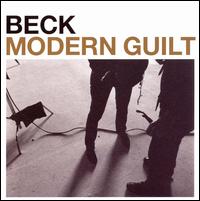
Beck
Modern Guilt
(Interscope; 2008)
By Conrad Amenta | 11 July 2008
Poor, poor Beck. At times saddled with an expectation for an almost Dylanesque (yeah, I used it) insight into the cultural zeitgeist—in his case a penchant for offhand observation, genre-hopping, and well-read eccentricity—each of his releases is viewed through the muddied glasses of a generational cartoon character. It’s a character made desperate by the realization that the limited power afforded the consumer act is rendered all the more miniscule by the notion that it’s all been done, little is worth downloading let alone buying, and the canon is to be viewed with the suspicion and disgust of a privileged hipster’s lofty position. Like Björk, even when at his most staid the songwriter’s personality is treated as placeholder for his music, a type of non-commitment from listeners and critics alike to hold him too liable for even his most earnest output. Each new album is treated to possess, or sit in the shadows of, pre-established, capital-R relevance that simultaneously excuses Beck’s artistic missteps and whitewashes his most refreshing accomplishments.
And yet Beck’s succeeded at expanding to such diverse and contentious territories as appropriated Brazilian, electro-pop, sad-sack breakup records, and what might be the nineties’ party experience. Once saying that a kid needs to learn how to use a box of crayons before learning to paint, Beck was articulating his paradigmatic mastery of the Fundamentals. Even if we don’t hold him to his music, behind the pockless portrayal of generational insouciance we can know, if we try, that he, if no one else, holds his aesthetic wanderings to the accountability of near-preternatural songwriting mechanics. Modern Guilt, his tenth (!) album, is his most reigned yet, despite the fact that he’s yet again reinvented himself. And here we thought that Beck had discovered the premier dynamic to be switching between understated acoustic confessional and wild, inventive-to-border-on-silly electronics.
That at this point the popular depiction of Beck is so quickly made a paper tiger may be unsurprising, given that Guero (2005) and The Information (2006) constitute a relative aimlessness, a loss of focus, a convergence of forms the return of which the listener is most immediately cognizant of on Modern Guilt. The album’s excesses, few that they are, are subsequent to the songs’ stripped meanness. Replace the Dust Brothers with Danger Mouse; hear the despondency in place of the “Debra”s (and one of the album’s first set of lines, “Thinking I’m standing but I don’t know where / Got this diamond that don’t know how to shine” and “we could learn how to freeze ourselves alive / we could learn to leave these burdens to burn,” will do nothing to dispel the tendency of some critics to assign Beck’s malaise a generational quality); recognize the hybridization of distinctly modern production with conspicuously traditional melodies. On a conceptual level, Modern Guilt accommodates every narrative thrust of Beck as a songwriter and as a good old-fashioned human being, but to do so would be to roundly miss the point.
The fact I’m trying to get at is that at least half of this album isn’t just the best set of music Beck’s put out in a long, long time, but some of the best music that will come out this year. I’ve had a playlist of the inspired jam “Chemtrails,” the impeccably layered “Replica,” the effortless and perfect title track, the catching chug “Youthless,” and the finesse of “Walls” on repeat since the album leaked. This scoped union is an apologist’s gesture, given, but albums don’t come exclusive to implacable formats anymore. Modern Guilt, perhaps truer to its title than even it intended, should be treated with all the ideological apparatus one employs to understand processed meat, and should be divorced from the expectation of fairytale celebrations put forth in the desire for newfound clarity. I’ve even seen some suggest that this album, which is about as lyrically deflated as Beck gets, is “political.” All I can say about this supposedly Situationist cry-to-arms is that it’s mildly disappointed at the situation us Western kids find ourselves in at best and thoroughly defeated by it at worst. None of this makes the music any less enjoyable to listen to. The concept of a modern type of guilt is probably supposed to imply the effortlessly achievable comfort and depressed humility with which much of the album is sung. Perhaps ironically, the best way to enjoy Modern Guilt is with blinders on to this sort of temporal perspective.
The album lists where it attempts to pull itself from the floor and assess the view through the window. “Gamma Ray” lazily cycles through its uninspired arrangement, making it an ideal first single, and “Soul of a Man,” during which Beck makes his clearest attempt at conviction, is the only truly awful song here. Alternatively, “Chemtrails” is instantaneous for its bewildered honesty, its childlike refrain of “So many people / Where do they go?” positing a new state of already-wounded wonder where mysteries are less appealing when “all I can see are boats sinking.” Return to the title track, where Beck’s unforced melodiousness despite his flat-voiced character synthesizes the song’s, and album’s, trounced feel: “I feel uptight when I walk in the city / I feel so cold when I’m at home / feels like everything’s starting to hurt me.” Those waiting for a “and therefore” will be left hanging, as appropriately unfulfilled as this depersonalized version of Beck, where sadness is not the cause of a breakup, or a mistake, but as axiomatic as one’s reflection in a dirty mirror.





